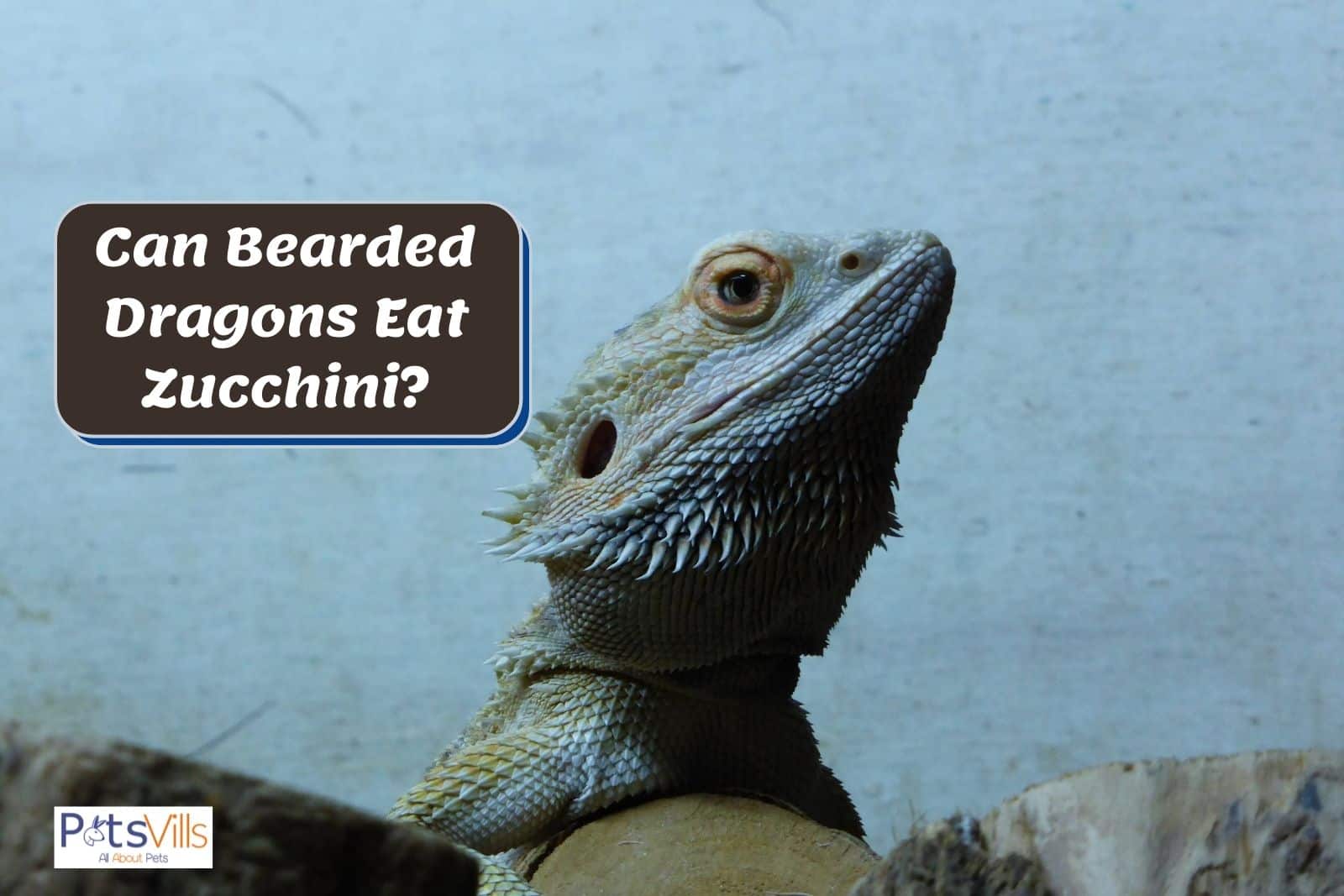Bearded dragons are omnivores that require a large variety of fresh food items, so you may wonder, “can bearded dragons eat zucchini too?”
As a beardie pet parent, it’s vital to investigate everything your feed your scaly pet.
Whether it’s dandelion greens, feeder insects, or garden veggies, the more you know about the risks and benefits, the better diet choices you can make for your bearded dragon.
Let’s dive right in and find out all about zukes and beardies!
READ MORE: Can Bearded Dragons Eat Tomato Leaves?
Table of Contents
Can Bearded Dragons Eat Zucchini?
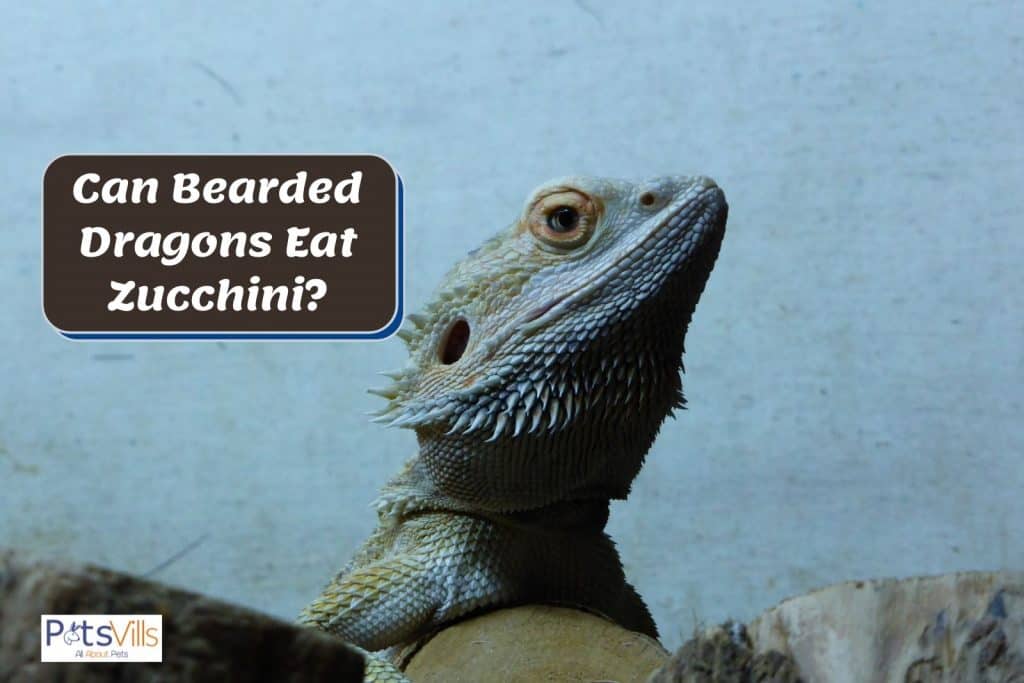
Bearded dragons can eat zucchini squash—also called courgettes or baby marrow— on an occasional basis. This means feeding a serving of zucchini only about once or twice a month.
It should always be fed with a vegetable with high calcium levels since this vegetable is quite low in essential nutrients, including calcium.
Therefore, zucchini is not a staple food for bearded dragons, nor should it be fed on a daily basis.
Can Baby Bearded Dragons Eat Zucchini?
A tiny bit of zucchini shouldn’t harm your juvenile bearded dragon. However, baby beardies need more calcium than adults. In addition, most of their diet should come from feeder insects.
So, it is better to avoid zucchini for the young ones. Instead, feed them high-calcium dark leafy greens such as
- dandelion greens,
- mustard greens,
- Swiss chard,
- turnip greens,
- or collard greens.
And limit leafy vegetables to about 20% of the baby bearded dragon’s diet. The rest should be from safe insect protein.
As the bearded dragon ages, you can gradually switch this to about 80% plant matter and 20% insects.
Can Bearded Dragons Eat Raw Zucchini?
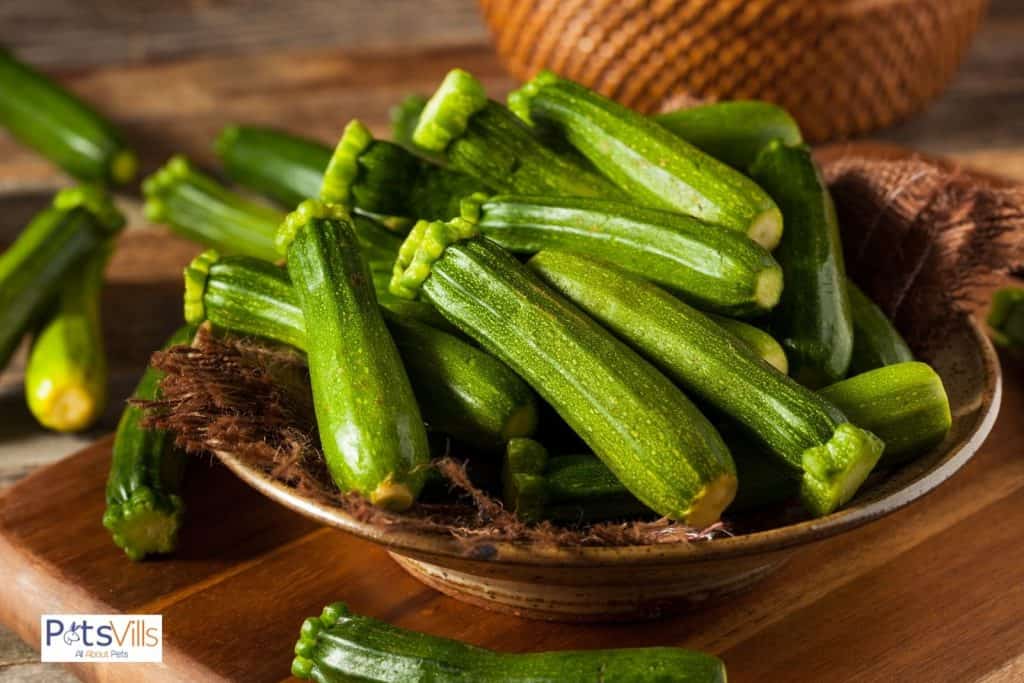
When you feed zucchini to a bearded dragon, it’s better to give it raw rather than cooked. Zucchini has a relatively poor nutritional profile compared to other options, such as swiss chard.
Cooked zucchini not only loses many of the vital nutrients it has, such as vitamin C but cooking by boiling will only add to the water content.
Watery foods like soggy cooked zucchini or iceberg lettuce can cause digestive issues for your bearded dragon.
Cooking with any kind of oil will only add dangerous and unnatural levels of fats to your dragon’s diet.
Can Bearded Dragons Eat Zucchini Leaves?
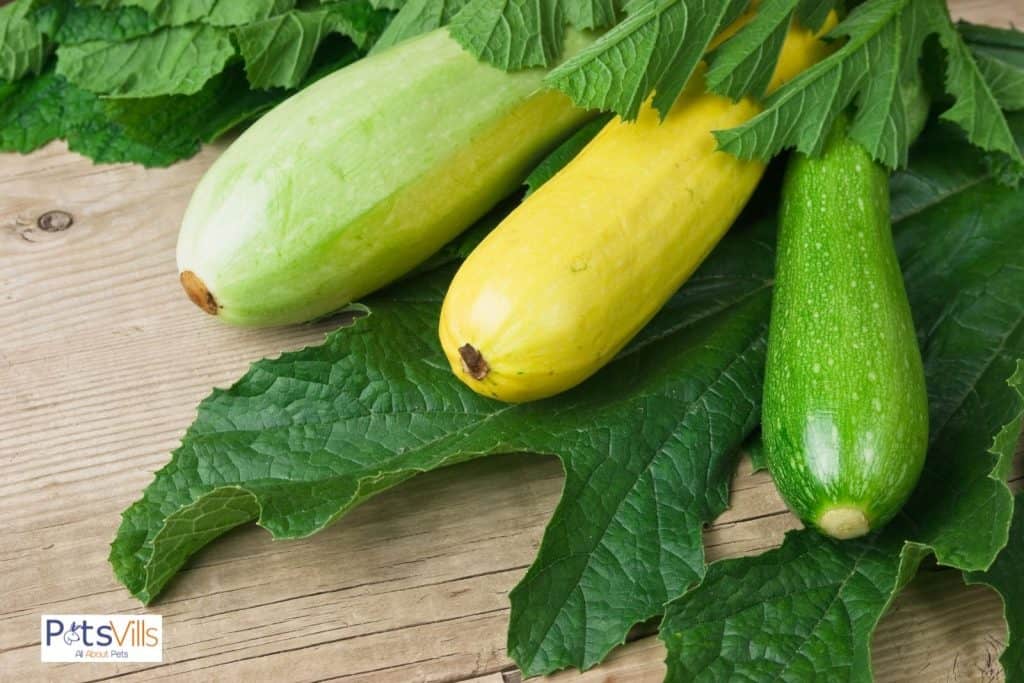
Technically, bearded dragons can eat zucchini leaves and most parts of the zucchini plant, including the stalk and flower, because it is an edible plant.
However, you would need to be careful of pesticides and be sure of the source.
Leaves from a young plant are usually safer than leaves from older plants. One of the bigger dangers of zucchini leaves is that they might come from a homegrown source.
Homegrown zucchini is more likely to contain cucurbitacin. This toxin is usually not present in squash or gourds you find in the grocery store.
However, the poison can quickly be bred back into the zucchini plant when it isn’t grown commercially or if it is exposed to heat and stress.
This is equally true of other vegetables in the same family, such as another summer squash, butternut squash, or even spaghetti squash.
TRY READING: Can Bearded Dragons Eat Bell Peppers?
Can Bearded Dragons Eat Zucchini Seeds?
Bearded dragons should never eat zucchini seeds. Although they are soft and edible, they can cause your beardie to choke and have no real nutritional value.
Take a look at this beardie enjoying some zucchini:
Related: Can Bearded Dragons Eat Curly Kale?
Things to Consider When Feeding Bearded Dragons Zucchini
Now that we know zukes are safe for beardies in general, let’s get into a few specifics.
Health Benefits of Feeding Zucchini
There are several nutritional benefits to feeding zucchini to a bearded dragon on occasion:
- Zucchini is high in antioxidants which can help prevent cancer and boost their immune system.
- Zucchini is low in oxalates or oxalic acid, which bind with calcium and prevent it from being absorbed by the body. This can cause a calcium deficiency that can lead to metabolic bone disease or kidney stones.
- Zucchini is not goitrogenic like kale or broccoli, so it does not interfere with iodine uptake.
- It is high in soluble and insoluble fiber that aids digestion and can help control blood sugar levels. This is important if you are also feeding food with high sugar content, such as blueberries. In fact, eating zucchini skin might be beneficial in controlling insulin levels and blood sugar. The zucchini peel may even help with thyroid function.
- The soluble fiber is also good for heart health.
- Zucchini contains moderately high levels of vitamin C and vitamin A, beta carotene, magnesium, and vitamin K. These last two are great for strong bones and tissue development. Vitamin A is also excellent for eye health.
- Thiamine, vitamin B6, and folate in zucchini maintain nervous tissue health while improving energy levels.
- It also contains potassium, which is good for nerve function and blood sugar levels.
Health Risks of Feeding Zucchini
Unfortunately, there are several reasons why zucchini should not be a staple vegetable, even in a varied diet.
- Zucchini is low in calcium, which is an essential nutrient for our lizard pets.
- It also has a bad calcium-to-phosphorus ratio of 1:4.4. This is far too much phosphorus since the ideal ratio is between 2:1 and 1.5:1.
- Like oxalates, phosphorus binds with calcium, preventing calcium from being absorbed into the bloodstream. This can lead to metabolic bone disease that causes shrunken bones and also cause further health issues such as kidney stones.
- Zucchini can sometimes be poisonous. This means bearded dragons should always taste any pieces of zucchini they want to feed to their bearded dragons and look for signs of bitterness. The bitter taste can indicate that it contains the toxin cucurbitacin. This poison irritates the mucous membranes in the digestive tract and can cause severe health concerns.
- Zucchini is not particularly high in nutrients. So feeding too much of it to your bearded dragon does not outweigh the health risks.
How to Feed Zucchini to My Bearded Dragon?
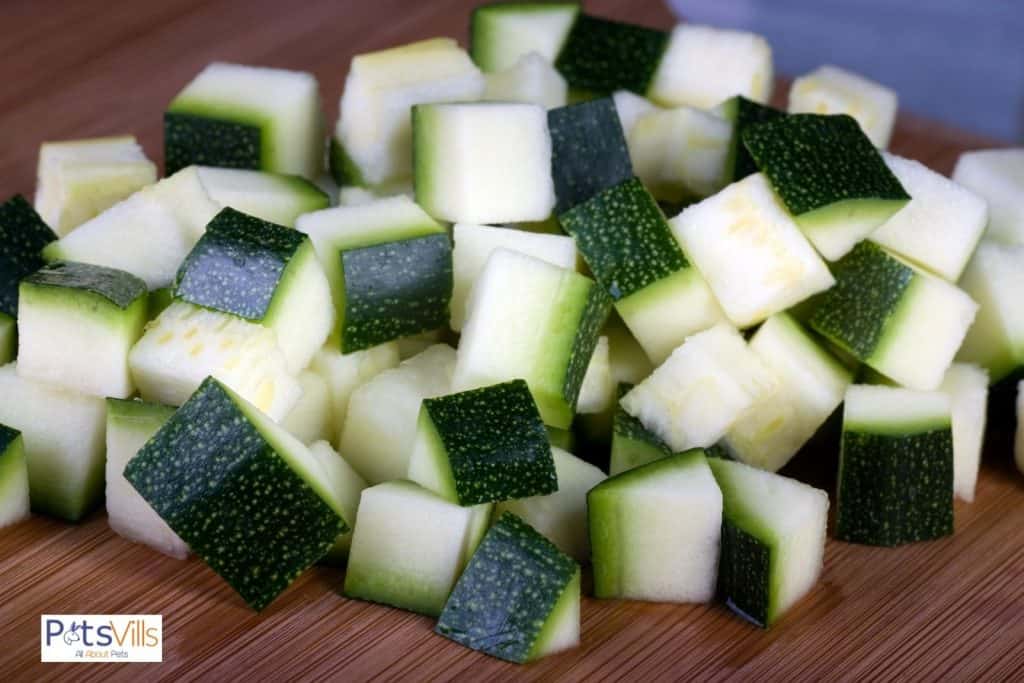
If you are adding a small amount of zucchini to your bearded dragon’s meal, it’s best to wash it and make sure it’s organic and free of pesticides. Wash it with clean water, and cut it into small bite-sized chunks.
Remove all the seeds as these have no nutritional value and can cause your beardie to choke. Add the zucchini to other nutritious vegetables in a salad bowl and consider dusting it with calcium powder.
Remember that zucchini is quite tough, and can large chunks can be a choking hazard. Always remove any uneaten food from the bowl afterward, as you never want your beardie to eat spoiled food.
For a complete feeding guide, check our new e-book:
FAQs
Can bearded dragons eat zucchini flowers?
Yes, bearded dragons can eat zucchini flowers. These are attractive and edible parts of the plant that can be cut up into pieces and fed as a topper mixed in with their salad. However, only feed flowers in moderation as an occasional treat, and be careful of any that come from a bitter plant that could contain toxic cucurbitacin.
Can bearded dragons eat yellow zucchini?
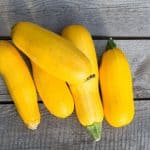
Bearded dragons can eat yellow zucchini safely if it is fed only once a week or every second week in moderate amounts. Yellow zucchini may have more antioxidants than green zucchini. However, it is still fairly low in vital nutrients and is a poor calcium source. Therefore, yellow zucchini is not a good choice as a regular part of the bearded dragon diet.
How often can beardies have zucchini?
Bearded dragons should only have a serving of zucchini once or twice a month. It’s best to feed it with a calcium supplement, as it is has a low calcium content and poor calcium to phosphorus ratio. This means too much zucchini can lead to health issues such as metabolic bone disease.
Conclusion
Zucchini is generally seen as a safe vegetable for bearded dragons. It has some essential nutrients, low levels of oxalates, and it is not goitrogenic like kale. However, this does not mean that it should be fed on a regular basis. Its low calcium content and high amounts of phosphorus can lead to health issues. Also, be sure no part of the zucchini plant is bitter, as this could mean it is dangerous!
References
- “Better Not to Eat: When Zucchini Is Poisonous – World Today News.” 2020. World Today News. June 2020. https://www.world-today-news.com/better-not-to-eat-when-zucchini-is-poisonous/?__cf_chl_jschl_tk__=pmd_057707ee0b5ab4aae590d4c511663d42c3a31757-1627886920-0-gqNtZGzNAk2jcnBszQi6.
- Ho, Cynthia H., Michael G. Ho, Shin-Pin Ho, and Helen H. Ho. 2014. “Bitter Bottle Gourd (Lagenaria Siceraria) Toxicity.” The Journal of Emergency Medicine 46 (6): 772–75. https://doi.org/10.1016/j.jemermed.2013.08.106.
- Petre, Alina. 2019. “12 Health and Nutrition Benefits of Zucchini.” Healthline. Healthline Media. February 19, 2019. https://www.healthline.com/nutrition/zucchini-benefits#TOC_TITLE_HDR_3.
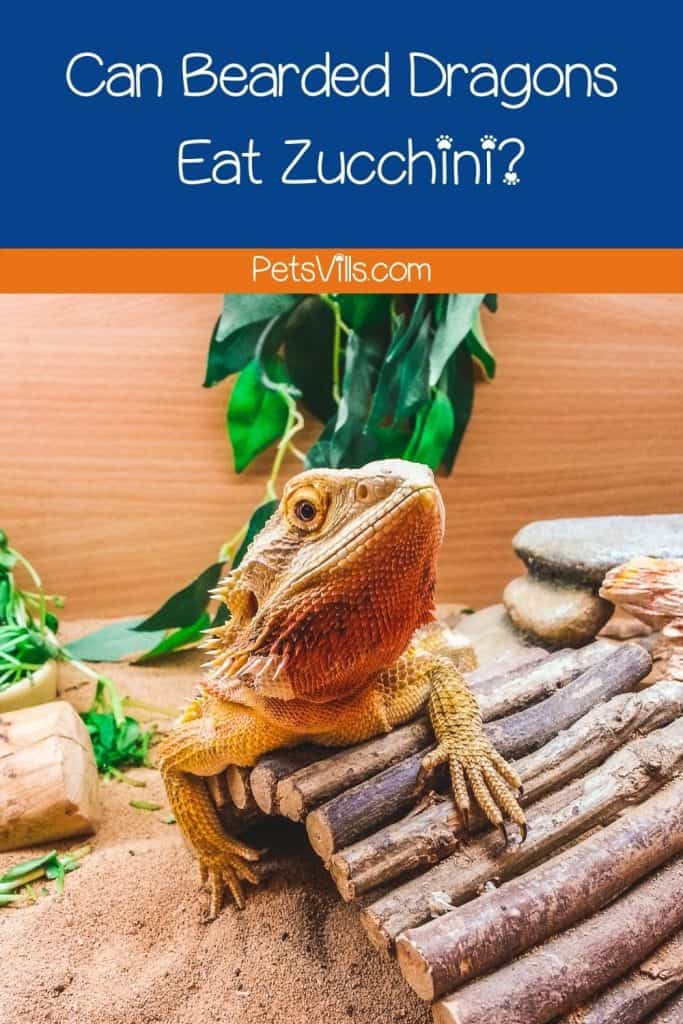
Can bearded dragons eat zucchini? Please share your thoughts with us below!

